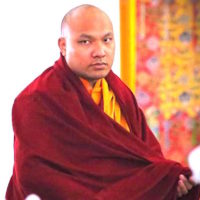What is the definition of practice? Taming our mind. Those of us who are supposed to be practicing Dharma should carefully examine ourselves – our body, speech, and mind – and become mindful of what we are doing. Otherwise, it is quite possible that although we have the form of a practitioner, we are not really practicing Dharma.
Watching carefully to find our own faults, however, does not mean that we have to look down on ourselves or feel that we are worse than others. We do not have to throw ourselves into the river. This is too extreme. What it does mean is that practicing the Dharma is like learning how to dance. When we are learning how to move our arms and legs, we can practice in a room full of mirrors. Seeing our reflection directly, we observe how we are doing even before someone else tells us what is wrong. We all have faults – that is natural and not surprising. We also know how to improve, because we know, or can learn, what to correct and change. Further, we realize that what we are doing is for our own benefit. So if we find some faults or mistakes that we need to change, there is nothing wrong with us; these are just what we need to work on. This is what is meant by “taming our mind.”

17th Karmapa
from the book
Read a random quote or see all quotes by the 17th Karmapa.
Further quotes from the book Traveling the Path of Compassion :
- The true test of meditation
- Why the Dharma is so important
- Discipline
- Teaching what is really useful
- Seeing what Dharma practice actually is
- Finding real solitude
- Why we need to give up our worldly concerns
- The Greatest Satisfaction
- Giving and Receiving
- Taking advantage of opportunities
- Our Actual Enemy
- Joyful discipline
- Avoiding criticism
- Putting ourselves in someone else’s place
- Seeing clearly what is genuine and what is false
- Remembering the Lama